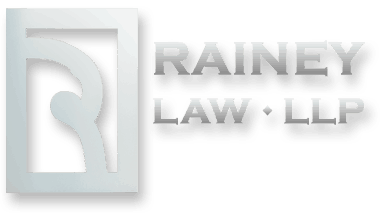 A young woman recently came to our offices, visibly upset, and told us about a problem she was struggling with. She thought she’d been wronged, but she didn’t understand how to address the situation or what legal options were available to her. The uncertainty scared her and left her asking where to even begin.
A young woman recently came to our offices, visibly upset, and told us about a problem she was struggling with. She thought she’d been wronged, but she didn’t understand how to address the situation or what legal options were available to her. The uncertainty scared her and left her asking where to even begin.
At Rainey Law, LLP, we review legal issues from different perspectives to ensure we’re offering creative solutions and negotiation strategies to provide the quickest and most cost-efficient resolutions. But when no reasonable agreement becomes available, we pride ourselves on bringing comfort to our clients by helping them understand and navigate the more formal processes to solve legal issues: including litigation, arbitration, and mediation.
Litigation
Litigation is the process attorneys and clients use to ensure the client has his or her day in court. Litigation allows clients to present their cases to a judge, and a jury (optional).
| Pros | Cons |
| Filing a claim forces the other party to participate | Often more time consuming |
| Opportunity to have case heard in most detail | Often more expensive |
| Must follow governing law | Hearings and case filings are available to the public. |
Litigation may become a necessary step in arbitration or mediation:
- Arbitration may require litigation when the parties argue whether the agreement to arbitrate is valid, and
- Arbitration and mediation may require litigation to enforce the arbitrator’s decision or the parties’ agreed resolution (settlement).
Arbitration
Arbitration resembles litigation, but it more private and can only be done by agreement. The parties present arguments and evidence to one, two, or three arbitrators, who make the final decision. The parties can choose whether the arbitrator’s final decision is enforceable, unless a statute states otherwise. If the parties signed a contract with a promise to arbitrate disputes related to the contract, the terms of the contract will often provide specific rules an arbitrator must follow.
| Pros | Cons |
| More private than litigation | The opposing party may not agree to arbitrate. |
| Generally more efficient than litigation | Review of claims less detailed than litigation. |
| The case filings are not public. | The arbitrator may disregard the governing law. |
Mediation
Mediation is a private process clients use to come to an agreed resolution with the other party (“settle”). Mediation is held in a neutral location, where a professional third-party mediator spends significant time meeting separately with each party to discuss claims and each party’s desires. Mediation often forces the parties to compromise since the mediator helps each party face the reality of any weaknesses their claims might have.
A court may order litigating parties to mediate their case before they go to trial, because many parties settle before trial.
| Pros | Cons |
| Parties often split the costs of mediation. | No jury, judge, or other neutral decisionmaker |
| Parties must agree on a mediator. | The parties must agree on the resolution. |
| Often leads to settlement when done correctly | Can be expensive with no finality guaranteed |
Our attorneys have over 100 years of combined experience helping clients litigate, arbitrate, and mediate their legal issues. We’re pleased to schedule a free consultation at our offices to discuss your situation and ways to address it. Contact us at 405-753-1504 to schedule your appointment today!
Visit our website or watch here to learn more about Rainey Law and how we can serve you!




